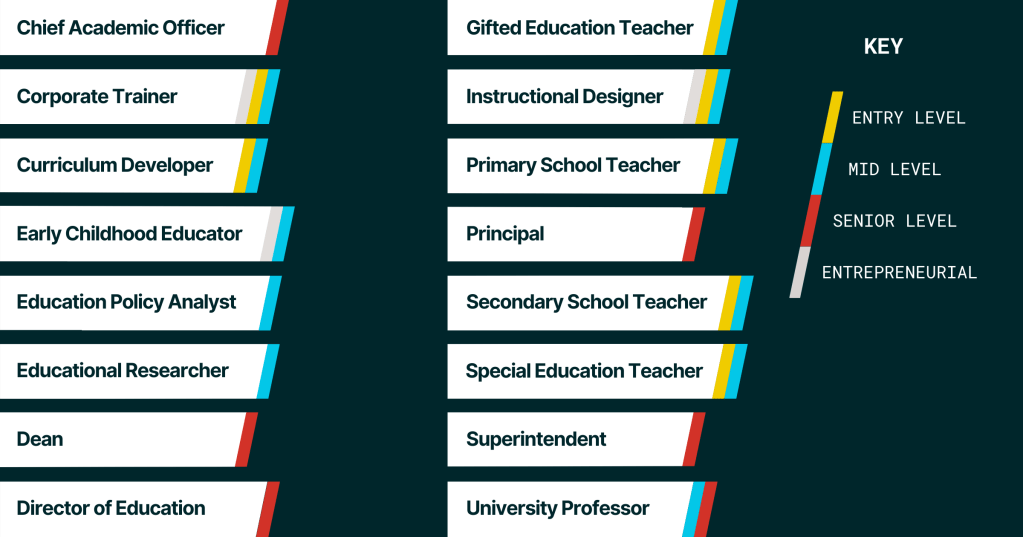In the field of education, possessing the right skills creates opportunities to inspire and shape the future. Educators have the privilege of not only transmitting knowledge but also instilling values and igniting a love for learning. Whether you aspire to be a teacher, counselor, administrator, or education specialist, the career paths within education offer a fulfilling journey of personal and societal impact.
Not convinced yet? Here are a few data points to give you an idea of what the industry has to offer and where it’s heading.

Let’s review this skill set together by discussing how education expertise can be acquired, applied, and transformed into a fulfilling career.
What can I do with education skills?
The roles within the field of education encompass a wide range of responsibilities, all centered on fostering effective learning environments and facilitating knowledge transfer. Here are some typical responsibilities you might encounter in education careers.
Educate children — Impart knowledge, skills, values, and social understanding to young learners to facilitate their personal development.
Educate adults — Offer adults effective learning opportunities and resources based on the principles of adult educational theory.
Manage educators or educational organizations — Oversee personnel, resources, and operations to ensure the efficient and effective delivery of education and the continuous improvement of learning outcomes.
Build educational products — Design, develop, and create tools, materials, or technologies specifically designed to enhance the teaching and learning experience.
To better understand the education skillset and how you can apply it, it can be helpful to hear the stories of others. Listen as Dr. Shavonne Gibson describes her role and the skills she uses to achieve success.

I am the chief professional learning officer at Relay Graduate School of Education. So that’s a very long title, which means that I lead our professional development work for teachers and leaders across the country. In this role, I am considered an instructional leadership expert, and I lead a team of coaches that support the work and facilitators who facilitate our content to audiences of mostly public and charter school educators. And the skills that I use are really vast. So I come in with an instructional background. I was a teacher. I was a school leader. I led a network of schools and I also worked at a state education agency. So I have all of that background, but the skills that I utilize in addition to instructional leadership alot of it is related to change management. So identifying what our districts are seeking and how they want to improve and then figuring out if we have a solution to match their needs. There’s a lot of relationship building in my role. I can’t tell you how many times I’ve met someone a number of years ago and they popped into my inbox like we haven’t connected in a while. I’d love to talk to you about something or have a problem that I’d love to get your insights into. So a lot of relationship building. Partnership development again that has a close relationship to engaging with folks to figure out what their needs and are we the right match. Then there’s like some raw management skills, right? I have to help my team solve problems. I have to help them prioritize or deprioritize tasks. There’s certainly time management. Sometimes I get a request for the board. I get a request to get a proposal out the door and I might have to deprioritize other things on my to-do list to ensure that I meet those needs in a timely fashion. So I think those are the skills that I utilize pretty consistently in my role.
Discover your career opportunities
Acquiring expertise in education can unlock a diverse array of career prospects spanning various educational domains. Here are some roles accessible to individuals possessing this skill set:

It’s important to emphasize that the roles mentioned above primarily revolve around education-related job duties. An education skill set is highly adaptable, often encompassing leadership, communication, and management skills. Individuals with education skills can excel in roles beyond the education sector, including positions in project management, sales, or consulting.
Expert advice
“Education skills are highly transferable – problem solving, communication and team work are skills teachers and school staff utilize daily. They also know how to include a diverse set of stakeholders (fellow teachers, students, parents, school staff).”
— Andrea Buwalda, career expert at edX

How can I acquire education skills and turn them into a career?
If you’re interested in pursuing your own career in education, we recommend considering these steps:
Research is key in any career, and a career in education is certainly no exception. Take advantage of all the information available, whether browsing the internet for job titles, listening to educational podcasts, or getting connected to professionals in the areas or positions that interest you.
Pro tip:
Explore your career possibilities. As part of your research, take every opportunity to learn more about topics in your desired field. Browse the edX course catalog at edx.org to see what education-related topics, courses, and programs interest you, and start building your education skills today.
One key part of the research phase is networking. This simple step is often overlooked and undervalued but can significantly impact your career trajectory. To clarify your career goals and aspirations, you must talk with professionals about what the work looks like.
You open a door of opportunity in your career by reaching out to professionals in your targeted fields, positions, and companies. Connecting with education professionals who could vouch for you and provide hard-to-find intel about the industries or organizations of interest is invaluable.
Pro tip:
We highly recommend scheduling informational interviews to learn from and connect with education professionals and hiring managers to gather information. These contacts can help you learn new skills, offer advice, and share job opportunities.
Check out our Networking Guide and Outreach Templates and Resources for help getting started.
To supplement your understanding of what others are doing professionally, gain clarity on your goals and aspirations. Ask yourself what about education interests you — the possibilities are endless.
A career in education requires a diverse set of skills to effectively facilitate learning and support learners’ development. Below is a list of skills relevant to success in the field of education.
Education-related skills:
- Classroom management
- Community building
- Curriculum design
- English language learner (ELL) competencies
- Instructional design
- Lesson planning
- Project management
- Special education competencies
- Subject-matter expertise
Transferable skills:
Transferable skills are the skills you carry from one job to another, enhancing your adaptability and versatility. Education skills are some of the most valuable, applicable, and transferable to other careers. Consider incorporating or highlighting some of the following transferable skills in your career journey: creativity, critical thinking, and public speaking.
Most modern educators utilize technology in their day-to-day work. Below is a list of technologies that may enhance your portfolio of skills.
Technologies:
- Collaboration tools
- Data management tools
- Educational apps
- Interactive whiteboards
- Learning management systems
- Online assessment tools
- Virtual learning tools
When it comes to acquiring education skills, you have numerous options. We recommend selecting a path that aligns best with your needs and learning style. Here are a few options to consider:
Self-education — If you are looking to learn asynchronously, informally, or casually, self-education is a great place to start. Many approaches to self-education support various career goals, budgets, learning styles, and time commitments. Here are some ways to self-educate:
- Informal opportunities: Gain a greater understanding of the industry by reading. Explore books, articles, and even research papers to expand your knowledge and learn what’s happened or is happening in the field. Not a reader? Plenty of videos, podcasts, and other forms of multimedia can teach you a thing or two about careers or work related to education.
- Online Courses: If you prefer a more structured or socialized learning experience, online courses might be a good option. edX.org offers several instructor-led and self-paced courses that may be of interest.
Professional certifications — Professional certifications are a great addition to an educator’s resume. The education field has several certifications that will enable you to work with a specific set of learners or make the next move in your career. A few to look into are TESOL, TEFL, CDA, and CTEFL. Also, edX.org offers many certificate programs that may interest you.
Degree programs — For those who are interested in a deep understanding of educational pedagogy, instructional strategies, or educational policy, a degree in education may be a good choice. A degree will help you establish authority in the field and speak to various approaches to education.
Employers hiring for a role may require a portfolio of projects, such as lesson plans, educational content, or courses. You’ll want to build a competitive online portfolio highlighting your skills and unique value.
Helpful resources:
The career team at edX has resources and workshops to help you fine-tune your application materials and prepare for interviews. Start with the Brand Statement Guide, Behavioral Interview Prep Guide, and LinkedIn Guide.
Once you achieve your career goal, celebrate your success. The career journey is full of ups and downs; every victory deserves acknowledgment.
With that said, your journey doesn’t end here — it’s only just beginning. Give yourself grace and understand that careers are not linear. Here are some ways you could continue growing your education skills.
Continued learning — Always reference our course catalog on edX.org for continued learning opportunities. It never hurts to brush up on your skills, expand your knowledge within the industry, or learn about other subjects that could apply to your work, interests, or something in between.
Promotions — As your expertise and portfolio grow, so will career opportunities. To position yourself well for promotions, you will need to stay current on educational topics and trends and develop leadership skills.
Promotions in education:
Here are a few senior roles you may want to work toward as you advance your career in education:
Chief academic officer — Direct all academic programs, faculty, and curriculum development within an educational institution or organization.
Dean of education — Manage and lead education in schools or colleges within universities, overseeing faculty, research, and curriculum.
Superintendent — The top executives in school districts, responsible for overseeing all district operations, setting educational policies, and managing budgets.
Pivots — Make sure to regularly check in with yourself and your satisfaction with daily tasks. If you are dissatisfied in your current role, take stock of what you like and dislike about it, keep your eyes out for company-sponsored growth opportunities, and pursue career pivots that optimize your background, skill set, and interests.
What could my career look like with an education skill set?
It is difficult to say exactly what your life would look like with an education skill set, but we can provide some insight. Consider how these may factor into your life plan:
Work with your passions — Coaches, content developers, and teachers all have the exciting chance to share their passion for subjects they truly love; for instance, science teachers who adore their subject often become exceptionally effective educators. This fulfillment comes from the joy of imparting knowledge and skills that you find valuable and interesting.
Choose from a wide range of options — Education professionals are in demand not only in traditional teaching but also in startups, medium-sized, and large-sized companies. As you grow as an educator, you will have the opportunity to consider several job titles and industries.
Impact the future — Educators shape the future by educating and influencing the next generation of leaders, thinkers, and contributors to society. They not only provide students with the academic knowledge and skills needed for success but also impart critical values, ethics, and social awareness. By fostering curiosity, critical thinking, and a love for learning, educators empower students to become informed, responsible citizens who can contribute positively to their communities and the world at large.
Expert advice
“Collaboration is the key in any type of education setting. You have to be able to work with other people. You have to have the soft skills to communicate, socialize and understand the inner workings of an organization. Collaboration is absolutely essential.”
— Dr. Ashlee Boothe, state and federal programs coordinator, Barbers Hill ISD

What are my next steps?
Learn more about education:
Register for a course on edX to learn about a variety of topics within the field of education, such as Reimagining Higher Education Teaching in the Age of AI, Teaching and Learning in the Diverse Classroom, and Leaders of Learning.
Watch a session
Watch a relevant session on our Events page to learn more about the industry and other professionals’ experiences within it.










